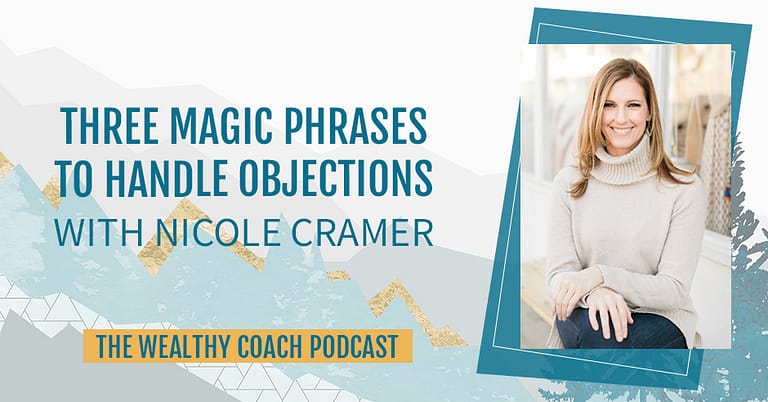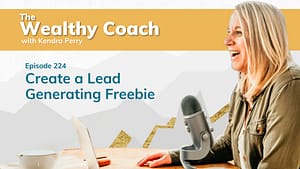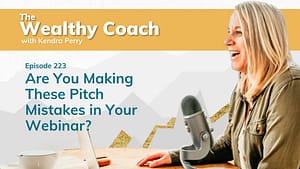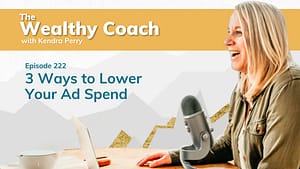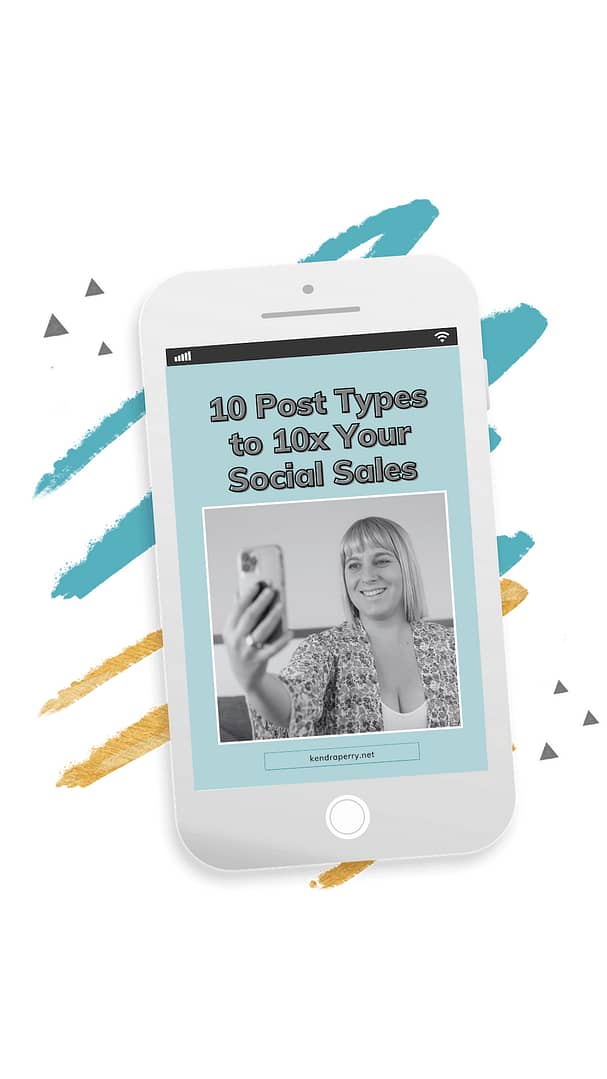As a salesperson, you need to shift your mindset on objections. Objections are actually signals that mean your customer is close to buying. Time is the most important thing in life. So if people are willing to object rather than just saying “no,” that means they are still interested.
Join Kendra Perry as she talks to entrepreneurial-based Sales Coach, Speaker, Corporate Sales Trainer, and an Exactly What to Say™ Certified Guide, Nicole Cramer. Listen in as Nicole shares three magic phrases you can use to handle customer objections. Learn how to really understand the customer and see where they are coming from. Find that curiosity inside them so you can make the sale. Discover these three magic phrases today!
—
Listen to the podcast here
Three Magic Phrases To Handle Objections With Nicole Cramer
Welcome back to the show. It’s nice to meet you or nice to have you back. I got butterflies because, in this episode, we’re talking about sales. I love talking about sales. You probably have all kinds of opinions about sales. Maybe you hate sales. Maybe you love sales. Maybe you don’t know how to do sales. All of those things are okay and normal.
Regardless of who you are, you are going to love this interview with Nicole Cramer. This is my 3rd or 4th time hanging out with Nicole. She was a speaker at my Wealthy Health Biz Summit. I was on her show, Healthy Steps with Nicole and now, she is on my show. Every time I talk to her, I am blown away because I learn something. Also, there are not a lot of people on this planet who share my love of sales. I am so fascinated by it. There is this whole psychology that goes into it. When you understand it, you get to work with more aligned clients and make money too.
Here is a little bit more about Nicole. Nicole Cramer is an entrepreneurial-based sales coach, speaker, corporate sales trainer and an Exactly What to Say™ certified guide. Nicole’s coaching and training company was founded with the intention to help entrepreneurs remove the challenges and fears around selling and learn how to use conversations to make more sales, get more clients and have a bigger impact on the world.
She left a very successful seven-year corporate sales career to pursue this passion full-time. She helps entrepreneurs, sales professionals and corporations to master their authentic sales process, achieve success and maximize their sales wins by bringing the art of communication to a whole new level. Let’s do it. Let’s hang out with Nicole.
—
Nicole, welcome to the show.
Kendra, thank you for having me. I’m excited to be here.
I’m always very pumped to speak with you because every time we talk, I feel like I learn something new or I get butterflies. I’m so pumped talking about sales because it’s fun.
We have fun. I feel like I learn something new every time we chat. It’s always fun to talk with somebody else who loves sales.
I know because everyone else hates sales but we love it.
We get to nerd out on it here during this time.
Can you tell our audience a little bit about how you became so passionate about sales?
What I like to tell people is I sold math to teenagers for fifteen years. I was a teacher and that was a big realization for me to start to understand what sales is. I’ll tell a quick story about that. I’d been a teacher for fifteen years. I taught high school Math. I wanted to challenge myself and try sales. I had a lot of friends that were in sales. It sounded fun. I’m an athlete. I’m a competitor. The idea that sales sounded like a game to me was attractive. I thought, “Let me try to get a sales job.”
I went on a sales interview and was so nervous that I was going to get called out for just being a teacher because my resume had teacher on it. That’s exactly what the guy said. At the end of the interview, he said, “I got to tell you. You impressed me and knocked this out of the park but I’m going to have a hard time hiring you over the 89 internal people who want this position because your resume says teacher.” He said the exact thing that I was so worried about.
At that moment, I looked at him and said, “I sold Math to high school teenagers for fifteen years and that wasn’t an easy sell.” He goes, “That is so good.” At that moment, do you know whom that statement was made for more than anything? It was me. I never forgot it after that. There was no transaction. Those students weren’t showing up and paying me to teach them Math but it helped me start to understand sales isn’t about the transaction. Sales is relational. It’s about the connection. It’s a transfer of enthusiasm.

None of those kids wanted to do Math. Out of a 30-person class, maybe a handful enjoyed what we were doing but they did have a need to get through high school and pass the class. The relationship that I built with them and the rapport that we had is more than anything that made us enjoy the experience. To me, that’s what sales is. It’s helping a person with a need that they have because you’ve built a relationship with them. It feels enjoyable to do that together.
I love that you say it’s about relationships. I always think that people think, “I became a business owner. Now, I’m getting into sales.” I’m like, “Haven’t you been selling yourself your whole life as you did with that job? You sold yourself to this employer to be like, “I can do this.” Also, what about dating apps? Aren’t we selling our personality on a dating app, hoping that someone’s going to swipe right?
Whether they want to acknowledge it or not, everybody is in the business of selling something. Everybody’s a salesperson. If you have kids and you want them to make their bed and clean their room, you got to sell them on it. I’ll use this example. I have a dog. If I want her to do different things, I’ve got to sell her on it. I’ve got to find out what’s meaningful and valuable for her. I’m like, “How can I get her to do the thing that I want her to do?” We’re selling when we’re doing that. It’s the influence and impact that we have. It’s important to acknowledge that. We are all selling something at all times.
I love that. It makes it a little less scary. You’re like, “I’ve been selling my whole life. I just have to do it in a little bit of a different way and context.”
Also, with maybe a different outcome in mind than all the other ones. It’s how you influence and impact it. It’s all based on relationships.
We’re going to dive into objections. Before we started recording, we were talking about how this is a big sticking point for people. People get freaked out by objections. They fear the objections. Maybe you can talk, for the super newbies in the audience, what are objections and what would you see as the most common objections when it comes to the coaching world?
First of all, objections are buying signals. It’s important for people to start to shift their mindset around what an objection is and see it as a buying signal. Here’s the thing. If somebody didn’t want what you have, they wouldn’t be consuming your content. They wouldn’t be following you or interacting with you. They certainly wouldn’t sign up for a call with you.
When they are in a conversation with you where maybe you’re discussing your services and they give an objection, that’s them saying, “I’m interested in this thing. I want to make sure it’s going to work for me. I have some unique thing or some concern that I want to ask you about. Can this package work for me,” and whatever their objection is.

In a cheeky, funny way, the way I always explain it to people is if somebody didn’t want something, they’d say no. For example, if I were to say to you, “I’m going to stab you in the eye with a fork,” you’d be like, “I don’t want it. I am certain that I do not want that.” You wouldn’t say, “Do you think it’s going to bleed a lot? I don’t know if I have the time to go to the hospital today. I’m not quite sure that it’s going to work for me.” You wouldn’t ask me those questions. You’d be like, “I don’t want to be stabbed in the eye with a fork.”
When somebody doesn’t want something, they can be very clear and communicate it’s not the right fit for them. If they’re asking some questions around it, which is what they’re doing, when they have objections, they’re saying, “I’m interested. I just want to make sure it can work for me.” It’s an opportunity to stay in the game and continue the conversation. What I like people to understand is it’s your opportunity to ask some more questions.
I love that so much. I’m always telling my students that objections are not a no but most people are misinterpreting them as a no. There are a whole bunch of different places that objections can come from. A lot of times, it can maybe come from fear or having a bad experience in the past, not believing in one’s self or maybe not fully understanding the value of the program or it can help them.
I would say more than anything, it’s the belief in themselves. It’s all of those things. I like to tell people, “You’re never selling somebody on you. You’re selling them on themselves.” We take action based on our beliefs. Once somebody believes in themselves, in the possibility and that this is the solution for them, that’s where the sale happens.
I’m a big believer that sales is the first step in transformation truly. When you sell someone into your program, they’re saying yes to themselves and making a commitment to themselves. That transaction may have hurt a little bit so they’re like, “I’m in. I’m invested. I’m going to do the work.” That’s truly what people need to be able to make a big change in their lives. That transaction needs to happen. I truly believe selling is the first stage in this beautiful, wonderful and glorious transformation that can happen for your client. If they give you the objection and you’re like, “I’ll see you later,” you could potentially be doing them a big disservice.
Here’s my question. You’re 100% right. How are you going to be the powerful coach for them if you can’t help them through an objection here? Everybody thinks objections only happen on sales calls. They’re going to have objections throughout the entire container of them working with you because change is hard for people. They’re going to have a lot of things come up that are going to be objections to them making the changes that they need to make to reach the transformation that they are looking to create in their life. How are you going to take a stand for them at any point in your coaching if you can’t take a stand for them in that initial conversation and help them make that difficult decision?
It is tough to make the decision to invest in ourselves. We’ve all been there. It’s a lot more than, “I need to find the money for this.” It means, “I want to make sure I’m going to show up. I need to create the time and space in my life to do this.” They’re going to have a lot of that throughout your coaching with them. You’re going to have to be able to take a stand for them and help them through some of those difficult decisions and changes that they need to make.
That’s a good point. It’s an interesting way to talk about objections because it is true. It’s nice when it happens this way but it’s rare that you work with a client who does everything you say and have this beautiful, smooth journey and suddenly, they feel amazing. It doesn’t usually unfold like that. You make it the odd person and then you wonder, “Is this person lying to me? What is happening here?”
In my program, the Health Coach Accelerator, I had a student reach out because I always send out little check-in emails and say, “How’s it going?” This person was like, “I was on this webinar the other day.” This person was talking about, “To be in the space that I’m in, I need to be running all these labs. I’m not certified to run labs so I feel like I’m at a standstill and I can’t move forward.” What I could do is say, “That’s no problem. Let me know when you’re ready,” or I could have an uncomfortable, hard conversation with this person, unlike the Impostor syndrome that they’re experiencing.
We have to be willing, at any given point, to have hard conversations with the people who are coming to us for transformation. They see that as possible with us so we have to be that person to take a stand for them. I can’t say it enough. It’s going to get sticky and icky during your coaching with them. To your point, it’s rare that we get somebody who’s like, “I’ll do it all. It’s easy. It’s no big deal.” They’re going to be uncomfortable a lot of times through our coaching. You’re going to have to coach them through objections quite often in your time with them. This is your first opportunity to do that and show them that you are able to take a stand for them and help them through some of these difficult decisions.

When we talk about the mindset around objections, people have this worry that they’re going to come off as pushy. We’ve all seen horrible representations of sales online and in person where it feels pushy, aggressive, inauthentic or sleazy. How do people overcome that mindset? I feel like we’ve all had bad experiences interacting with sales.
I don’t know if you’ve ever read The Four Agreements but one of the things I always come back to is, “Don’t ever take anything personally.” If somebody is triggered by how you’re in a conversation with them and encouraging them to make a decision, a lot of times, their experience of that and how they feel about that has nothing to do with you. Even when you’re not being pushy sometimes, people are going to walk away and be like, “Oh my gosh.” Whatever their experience is, it’s personal to them. That’s important to remember.
There are high-pressure sales tactics out there that people use. It can leave you with a bad taste in your mouth. It is important for each of us to remember what it is that you’re selling. Are you selling something that’s going to hurt somebody? Are you selling something bad for them? At the end of the day, you’re coming from a beautiful space. You’ve created something that can change their lives. Whether or not they make up their mind to step into that or not is how you have the conversation to help them come to that realization that they want it. You’re never selling anybody anything. You’re helping them make a buying decision to step into something that could change their life.
A lot of times, people are like, “I feel sales-y. I feel slimy like I’m doing something wrong.” Are you trying to sell them something they don’t need? Maybe we need to have a different conversation. If you’re trying to sell a TV to a blind man, they don’t need it. At the end of the day, if you’re coming from that heart-centered, authentic approach that you know you’re selling something that can help somebody, it’s important to connect to that.
Also, remember it’s not right for everybody. Not everybody’s going to want your thing. It goes back to we can’t take it personally. If it’s not right for somebody, it doesn’t make what you’re doing wrong. You’re not trying to sell something to somebody to hurt them. You have something amazing for the right person and not everybody’s going to be the right person.
The great majority of people who follow you or are on your email list will say no and that’s okay. We got to focus on the people who say yes. The people who say yes, it was right for them. We’re going to be talking about some magic phrases, which I love. Before we dive into those, can you tell us why you call these magic phrases? We’ll then go into the question.
There are a couple of things. I’m glad you asked that because a lot of times, people are like, “Tell me the phrases.” Let me step back for a second to when I was a Math teacher. I didn’t just hand out formulas and say, “Here, go use this formula.” I taught why it worked and how to use it. If I just hand you a formula, you might plug the wrong things into the wrong places and you might not understand why you’re getting the results that you’re getting.
It’s not that these phrases that I teach people are like, “When somebody says this, you say this.” It’s not a game of pairs. If I knew the perfect answer that you could use every time that made them go, “You’re right. I can’t afford it. I’m good,” I would sell that to everybody in the world and everybody would know it. We would all have the answer. At the end of the day, it’s not about having the perfect response that you always say and that works every time. It’s about getting into conversations, staying curious and building empathy.
Some pieces are important to you and how you approach conversations. It’s the energy that you approach it with that starts to make these phrases so impactful and effective. Staying curious is super important because it’s how you show somebody that you care. When we always approach with that energy of curiosity, that’s what we’re saying to the person. You’re like, “I care about you.” You’re uncovering more context to help the conversation. That also dances you towards empathy. When you start to show and feel empathy, what you’re doing is making yourself relatable to the other person. I call it the Show Me That You Know Me button. You’re showing that you know and understand the other person. You’re making yourself relatable to them.
When you stay in curiosity long enough to build empathy and understanding, then you have the courage to ask some of the hard questions. You have the courage to take the conversation where it needs to go and challenge that person a little bit. Here is an example that worked for me years ago. The very first business coach that I ever invested in years ago, for the first 25 minutes of the call, I was telling her all the reasons why I couldn’t figure it out on my own.
I hadn’t done it yet. I needed guidance. I spent 25 minutes telling her all the reasons why I need it and then she told me about the investment. I was like, “Am I going to put a price tag on my dreams? I just spent 25 minutes saying why I need it and then I’m going to bulk at the investment.” She said, “I get it. It’s a big decision to make. Are you more committed to your dreams or your comfort zone?” She had every right to ask me that because she had taken the time to ask me questions, gain context and gain an understanding that I didn’t know what to do and I hadn’t been able to figure it out on my own.
What was I going to do if I didn’t move forward? I had already identified that this was the solution that I wanted. I did make the investment so everybody knows. A lot of times, people are going to feel uncomfortable. It is going to be hard for them. Are you going to be the one that takes a stand for them and helps them through making that tough decision? When you take the time to stay curious, gain that context, gain that understanding and become relatable to them, then ultimately, you have earned the right to ask some of those questions, help them see where they’re holding themselves and allow them the opportunity to make a decision that feels good for them.
The reason that they’re magic is that you’re approaching the conversation from those two, with curiosity and building empathy. The other reason that these phrases work is they speak directly to the part of a person’s brain that knows how to make decisions. This is the part of the brain that does not get stuck in Maybe Land. It gets very clear yes or no outputs. It’s the subconscious. When we know how to talk to a person’s subconscious, then we’re able to effectively help them make decisions more efficiently.

If anybody wonders what the subconscious does, it’s the reason that you’re breathing and you don’t have to tell your body to breathe. It’s the reason that you fall asleep and your heart beats all night long and you don’t have to tell it to. Let’s say you take your kids to school every morning and there’s one morning where you’re like, “I don’t even remember the drive here,” it was because you were on autopilot. Your subconscious was already programmed and knew the way.
Your subconscious is able to already know what you want before you do and it knows just yes and no outputs. When we speak to a person’s subconscious, we’re able to help them make more powerful decisions. That’s why they’re magic phrases. You’re helping somebody make a decision, not just telling them what to do or selling them something.
Curiosity and empathy are so important. You approach that on your sales call or when you’re in direct messages with people. It’s so powerful. Also, there’s this concept of seeing the person, hearing them and creating that space where you can use these phrases. It’s like you said with your coach. She had every right to ask you, “Do you care more about the investment or your comfort zone?” She had built that in advance, right?
100%. That’s what we’re doing on any discovery call or any sales conversation. You are gaining, understanding and getting to that point. That’s what gives you the courage to ask those questions. The things that I’ll ask sometimes in a sales call is when I hear somebody hesitating, maybe they have quite a few objections or quite a few things they’ve brought up, I stay curious. At that moment, my curiosity leads me to believe, first of all, why are we still in this conversation?
Time is the most valuable thing anybody could ever pay us with. If somebody has scheduled time on my calendar and they’re still in a conversation with me and they’re struggling, what they’re struggling to do is to say yes. Otherwise, if it was a clear no, they’d already said no and we wouldn’t be on the call anymore. In my mind, I’m thinking, “Why are they struggling? Why are they still in this conversation?”
I’ll straight up ask what some people might say is a ballsy question. At that point, I’ve earned the right. I’ll say, “I’m hearing that there’s some hesitation in what you want to do. Why is this not a hard no for you? Out of curiosity, why won’t you tell me no?” The majority of the time, they’re like, “It’s because I know I need this and I can’t figure this out on my own. I scheduled this call because I love everything that you post and what you say. I know it’s going to help me.” Who’s doing the selling at that point? They’re reminding themselves why they were in this conversation, to begin with, which is exactly what we want. That’s exactly why we want to ask good questions.
Your role in a discovery call or a sales conversation is to ask good questions. The person in control of the conversation is the person asking the questions. Many times, people are like, “What do I say? How do I know what to say?” You stay curious. Your curiosity will drive what your questions are and where you take the conversation. It’s important because that’s what gives you the courage to ask some of the hard questions. It’s like, “Why are we still in this conversation? I hear you hesitate a lot. Why are you still here? What decision do you want to make?”
Sometimes, I’ll say, “This is a hard decision because this means a lot of change. This means you’re making an investment. That can feel very uncomfortable. It means that you’re going to take on some new habits and apply yourself in a way that you never have. What is it about this time that makes you know that this is what you want to do?” It’s getting clear with them and asking, “Why are we still here? Why are we still in this conversation?” That is important in the conversation because they get to hear themselves say it. You’re asking the question but they’re reminding themselves why it’s important to them to still be in that conversation.
Let’s jump into these three magic phrases for objections. Tell me number one.
What Makes You Say That?
They are in no particular order. There are so many that we could have covered but I distilled it down to three so that we could have some helpful, actionable phrases that people can go start using. One of the ones that I love and fall back on all the time when I’m like, “I don’t know what to say,” is this. “What makes you say that?” I don’t think every objection or question warrants a response from us to that question. Sometimes, we answer a question with a question so that we can gain more context.
If somebody’s like, “I don’t know. If I were to do this, when could we get started?” Do you know what I’m going to say? I’m not going to say, “I have 1 or 2 spots open next week.” I’m going to say, “When would you like to start? Let me find out from you. When is it important?” They might say, “I’d like to start as soon as possible. The holidays are coming up and I have a lot going on. I can’t start until February.”
Help Me Understand
If I answer that question, I’m making an assumption. I don’t want to answer that question. I want to find out what’s important to them. I’d be like, “When do you want to start? When would it be important for you to start?” Answering a question with a question is helpful. When somebody says, “I don’t know if I can afford this,” I’d be like, “Out of curiosity, what makes you say that?” Have them unpack it for some further context. You don’t know anything about their situation. I’m sure you know this too. You probably teach this to your clients. A lot of times, the money objection isn’t about the money. People can find money and they will if they want something.
People buy million-dollar homes. The minimum spending is $500,000 for a home. Where do people get that money from? They don’t have it in their bank account. They make it work, though.
They go leverage it from a bank and what’s available to them. People can find the money. I always use this example. I’m like, “Is $5,000 a lot of money?” You might be like, “Yeah,” or, “No.” It depends on what you’re measuring it up against. Somebody’s like, “$5,000 is so much.” If I said, “I’ve got this beach house. It’s worth $2 million. I have to sell it in the next 24 hours. I’m going to sell it for $5,000 as long as you can come up with the cash.”
They would 100% get me that cash so fast. They’d beg, borrow and steal. It’s not my business where they get it from but they would find it. It’s also not our business where somebody gets it from if they want to make an investment in us. At the end of the day, the money objection does deserve some more questioning. You’re like, “Let me gain some more context.” I’ll say this from my experience as well. I’ve used, “I don’t know if I can afford it,” and I 100% could. It was an easy way for me to stall.
Another thing that I like to ask people is, “It sounds like you’ve made a decision about what you know you want. Have you given yourself permission?” That’s a big distinction. Most people are still in that conversation with you because they know what they want. They have not given themselves permission to say yes. That’s where their struggle is.
Most of the time, it is not about the objection itself. It can come from a lot of places, especially for health and wellness coaches, which whom you and I work with. A lot of times, health is a very sensitive subject. People have assigned themselves shame around some of their decisions regarding their health and wellness. There’s some unworthiness like, “Am I worth it?” It’s not that they don’t have the money. They’re afraid of investing because they don’t know if they’re worth it.
That’s not the case for everybody. I’m not blanketing this and saying, “Everybody’s concerned if they’re not worth it,” but with health and wellness, a lot of times, we have to remember this is very sensitive and emotional. There’s a lot of self-judgment around how they’ve gotten themselves to the place that they’re in.
I had a client a couple of years ago. He helps his clients with massive weight loss. We improved his conversion rate. It went from 25% to 42% in a matter of 2 weeks because he started to understand where people were hung up in making a decision. It’s because they felt, “I’m the one that got myself to 300 pounds. Whom would I be to invest in myself? Am I worth it?” They were feeling a lot of shame around doing something positive for themselves because they’d made a series of what they would consider poor decisions to get themselves to that point. They’re embarrassed. They don’t know if they’re worth making that decision.
The amount of psychology that goes into that is huge. Ultimately, in the end, maybe it won’t be right for them but at least give them the chance to unpack it and see if you can help them come to a decision, one way or another, that they feel empowered about and good about.
That’s what it is. It’s about helping them make a decision. A lot of times, those people will come back eventually. Sometimes, we’ve served them at that moment by creating awareness for them that they didn’t have before. You’re still helping them in every conversation that you’re in with somebody. Our goal is not to be attached to the outcome of, “I need them to say yes.”
Here’s what you want in every sales conversation. You just need a decision. Here’s something else that you can do at the beginning of a sales conversation that will help some of the objections towards the end. You can say at the beginning when you pre-frame, “We’re going to talk about some things. I want to ask some more questions to gain a full understanding of your situation and see what recommendations I can make that can help you. Out of curiosity, if this feels aligned for you and you feel like you’re ready to take a step forward, is there anything that would hold you back from making a decision now?” Don’t wait until the objection comes up because then, you’ve lost all the power. You’ve given your power away to the objection.

If you’re sitting there the whole time going, “I hope they say yes. I hope they don’t have an objection,” why don’t you find out at the beginning? Ask, “Is there anything that would hold you back from moving forward if you decide that this is the right fit for you?” They might say, “I still have to talk to my partner. I would have to move some money around. I’m not sure how much it’s going to cost so I’m here to find out some information.” You’re like, “It sounds like you’re here to find out some information about a decision you may want to make later on. Is that correct?” They’re like, “Yeah.” You’re like, “What information can I help you understand so that it would move you closer to making a decision?” You’re very clear.
At the very beginning of the call, you know the call is going to go in a specific direction. They’re here to find out some information. You’re there to make a connection, build rapport, help them know whatever information they need to know and then maybe schedule something for a couple of months later when they might be more prepared to make a decision at that time.
You don’t come across as needy or as, “They’re in this conversation and I had an opportunity to get them.” You had an opportunity to build rapport and get them closer. There are now buyers, soon buyers and later buyers. Maybe they’re a later buyer. That conversation is going to serve them so that they will come back and be a later buyer. When you pre-frame at the beginning and you find that information out, it helps you direct the call in a way that will serve them.
It does take the pressure off because then, you’re not like that moment at the end where you’re like, “Are they going to buy?” You’re like, “I know this person wants information. They’re probably not going to be a now buyer but that is okay. I’m going to serve them the best I can and we’ll see what happens later.”
I’ve had people at the beginning say, “No. I’m here for some information,” and then pay me in full with the credit card by the end of the call. They’re like, “Here you go. Here’s my payment.” A lot of that has to do with when we’re not in that needy energy of, “I’m trying to make a sale from this.” You’re like, “How can I help you? It sounds like you’re here to get some information. What will make this call successful for you? What can I provide?” They feel like, “I want this thing.” They’re leaning in because they’ve realized whatever realization they’ve had. They’re like, “I know I want to do this.”
It’s so good because it’s so true. I’ve had people be like, “Your program’s too expensive. I can’t do it now.” The next day, they’re like, “I thought about it all night. I’m going to make it work. I’m doing it today.” I’m like, “That’s great.”
It’s almost like you get them so interested but you don’t need them. I know this happened to me with one of my first investments. I am obsessed with it. She let me off the call. She was like, “Let’s catch up in a couple of weeks and you can let me know where you’re at.” It was like, “Now, I want it more,” because it wasn’t on the table for me. She took it off the table by saying, “Let’s follow up in a couple of weeks.” I was like, “Now, I want it.” I figured it out and made it work.
I don’t want to run out of time so let’s jump right into magic phrase number two.
This is a powerful one. It helped me understand. If somebody’s like, “I don’t know if I can afford this,” I’m like, “Help me understand what made you want to get on this call.” Here’s the thing. Nobody wakes up one morning and says, “What free calls can I sign up for today?” They’re not booking a bunch of calls for gigs to waste their time. They’re in this conversation because they want to be there. When they say something like, “I’m not sure if I can afford this. I don’t know. It’s a big investment,” say, “Help me understand what the cost is to you now if you don’t take action.”
Here’s what I can’t do at that moment. If somebody says, “I don’t know if I can afford this,” I can’t say, “You can,” because I don’t know. It’s not my business. I don’t see their bank account. I don’t know what they’re working with or what they have access to. At that moment, my job is not to respond with, “You can,” because I don’t know. My job is to stay curious. I’m like, “We’re in this conversation because you got some things going on that you aren’t happy with and don’t feel good to you. You’re ready to make some changes. Help me understand the cost to you not doing something about this.” They are responding with, “Here’s what’s happening and what’s going on.”
Is it costing you your quality of life? Is it costing you fun activities with your grandkids? There is a cost to you for not doing something about this. For them to draw the line at, “I don’t know if I can afford this,” I’d be like, “Help me understand how you can afford to stay where you are.” It’s a game-changer. I’m like, “If you can’t afford to move forward and do something about this, help me understand why you can afford to stay where you are.”
Our goal is not to get them to a yes. Our goal is to get them to a decision that’s the best and highest good for both people. We don’t want to pull somebody over the line that isn’t ready to do the work because that’s going to make for an uncomfortable situation for both. They’re like, “I’m somebody who is right.” I’m sure you’ve been there. I’ve been there. It’s like, “This person is not prepared to do the work that it requires.” That’s what we’re doing. We’re helping them make a decision. These types of questions help them frame in their mind, “What is it costing me to stay where I am?”
Maybe the decision is, “I could afford to stay in the place that I’m in and I’m fine with that.” That’s their decision and that’s fine. I love how these questions help get that clarity around that. We’re professional decision-maker helpers.
We are professional mind-maker uppers. That’s what we are. You’re helping somebody make up their mind. Whatever they make up their mind benefits you too because you don’t want somebody to say yes when they mean no. You don’t want somebody to say no when they mean yes. A lot of times, people need that helping hand to make that tough decision. You might be the only person that cares enough in their life to help them do that. A lot of people are like, “Stay where you are. It’s okay.” A lot of people are willing to let them stay in that comfortable land that they’re living in.
We have, “What makes you say that?” and, “Help me understand.” What’s our number three?
What Do You Understand?
I would say the third one is, “What do you understand?” It’s similar to, “Help me understand.” It’s, “What do you understand about the benefits of doing this? What do you understand about the consequences of not doing something here?” We can’t say to them, “You do have enough time. You don’t need to talk to your partner.” We’re like, “What do you understand about the consequences of not making a decision to do something about this?” It’s kicking it back to them. They might be like, “I don’t know what the consequences are. I don’t know what might happen to me if I don’t do something about this.”
If somebody says, “I need to talk to my partner first,” you could say, “When was the last time you had a big decision to make and you want to talk to your partner about it?” They might say, “The last time was when we were going to buy a car.” You’re like, “How did that feel? How did you approach that conversation? Do you feel like you’re asking for permission or are you asking for support?”
I love that support versus permission. I worked with women when I was a health coach and so often, it was permission. I’m not going to go down a rant on that but sometimes, it’s this mutual discussion between two mutual partners that need to happen because they share finances.
It’s important. I’m like, “This is a big decision. It’s an investment that you’re going to make. I respect you want to go to speak to your partner about this and to be on board together. The question is, are you asking for support or permission?” When you frame it for them, it’s a different conversation that they are about to go have with their spouse or partner because they’re clear. They’re like, “What is my intention with this conversation? I’ve made a decision. I’m not going to ask my mom or my dad if it’s okay. I’m not asking for permission. I’m saying, ‘I’ve made a decision to do something important to me. I’d like your support in helping make this happen.’” That’s a different conversation.
We want people to feel empowered and confident. We want people to trust themselves. What’s happening a lot when somebody’s like, “I need to go talk to my partner,” is many times, they don’t need to talk to their partner. They’re afraid to make a decision for themselves. They don’t trust themselves. That’s a distinction for us to make.

I have another quick bonus that I’ll share with you that you could say at the beginning of the conversation. You’re going to get my Discovery Call Flow Script. You’ll see the entire flow of a discovery call. I’m going to toot my own horn. It’s incredible. It’s got the entire flow of a discovery call. It’s got tons of questions in it that you can use which are great ways to have a conversation.
At the very beginning, you can say, “We’re going to talk about some things that I’d like to help you through and make some recommendations. If you like what we talk about, we can also take some time to talk about my program. I can answer some questions for you if that interests you. Out of curiosity, is there anybody else in your life whom this decision will impact?” Find out at the beginning of the conversation.” Don’t wait until the end to find out there is a partner that they needed to go check with.
You could do your work playing detective at the beginning and find out, “Is there somebody else who’s going to be a part of this decision-making process with you?” It helps you have the intel that you need to take the conversation in a different direction. You’re then clear the person might not be there to make a decision. They might be there to get some information so that they can go off and make a decision the way that feels best for them.
I’m full of butterflies as I always feel after I talk to you. I got to come back, read and take notes. I love it. If people want to stalk you online, how can they stalk you?
They can stalk me on Instagram @TheNicoleCramer. They can find me on Facebook. I am Nicole Cramer. Pretty much, I’m Nicole Cramer or The Nicole Cramer everywhere. If they want some more great support and instruction on discovery calls, I have a YouTube channel. That is also @TheNicoleCramer. There are a ton of videos on there, great questions you can ask on discovery calls and more stuff on overcoming objections and the flow of a discovery call. I would love for anybody reading this to send me a DM on Instagram. I will also be happy to share a free gift there as well. I have a masterclass that I’d be happy to share with anybody who reaches out and connects.
I love that so much. Thank you, Nicole. I do not want to make you late for your next appointment because I already have. I feel like we could talk about this forever. Thank you so much for being with us. I know the audience is going to love this one. Thank you, everyone, who’s reading. I appreciate you being here. I will see you next time at the same time and the same place where I help you become wealthy AF.
Important Links
- Nicole Cramer
- Healthy Steps with Nicole – Past Episode
- Health Coach Accelerator
- The Four Agreements
- Discovery Call Flow Script
- @TheNicoleCramer – Instagram
- Nicole Cramer – Facebook
- @TheNicoleCramer – YouTube
About Nicole Cramer

Nicole’s coaching and training company was founded with the intention to help entrepreneurs remove the challenges and fears around selling and learn how to use conversations to make more sales, get more clients, and have a bigger impact in the world. She left a very successful 7-year corporate sales career in order to pursue this passion full-time.

